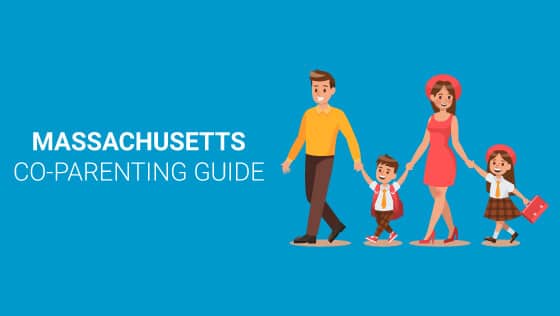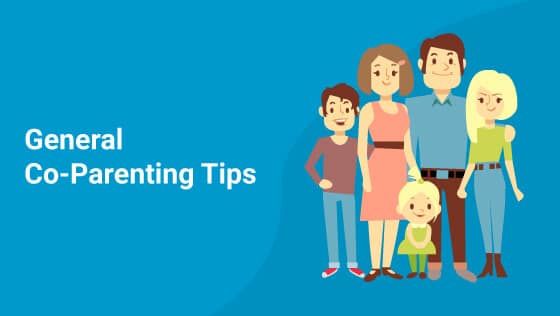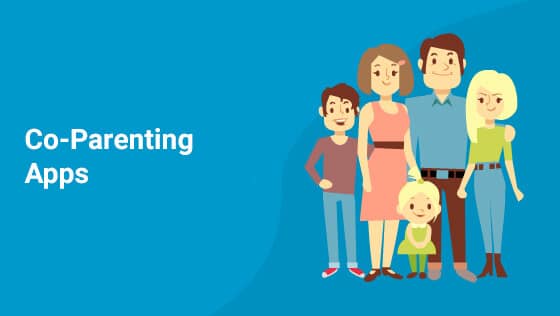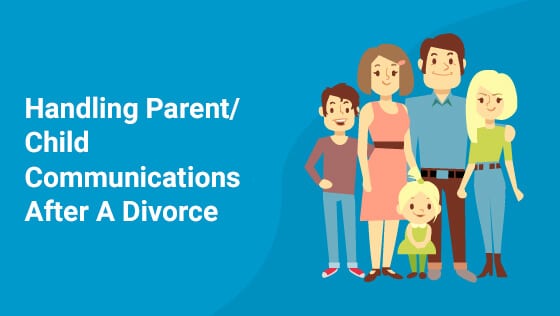Massachusetts Co-Parenting Guide

After going through a separation or divorce, being a co-parent is especially challenging. If you had a high-conflict breakup, you can feel so frustrated, angry, and betrayed that you want as little contact with your ex as possible. Even if the relationship ended on relatively amicable terms, you’re facing a new parenting situation that includes visitation schedules, pick-ups and drop-offs, and some holidays spent sharing the kids.
You’re probably wondering if you can do it. The answer is yes, absolutely!
The secret is to make your kids your first priority. Unless family dynamics recommend otherwise, children have the right to maintain a loving and close relationship with both parents. You may wish that you’d never laid eyes on your ex, but to the children, he or she is still Dad or Mom. They need and want both of you to be actively involved in their care and upbringing, so the better prepared you are to work together, the happier they will be as they grow up.
To assist you in this important journey, we have listed some resources that you may find helpful. They include everything from general tips to mobile tech, books, and articles that provide valuable guidance.

General Co-Parenting Tips
If you’re new to co-parenting, these articles and resources will offer valuable insights. They range from general advice and scheduling tips to ways that you can overcome special challenges like holidays.
5 Co-Parenting Tips for Newly Divorced Parents: If you’ve never been a co-parent before, therapist Andra Brosh goes over the basics, like putting your children’s needs first and maintaining support and structure in your own life.
The 10 Commandments Of Co-Parenting: Although Divorced Moms is a website aimed at helping women deal with divorce issues, this co-parenting article has advice that will resonate with fathers too.
Planning For Shared Parenting: This co-parenting guide from the Massachusetts Association of Family and Conciliation Courts has valuable tips for designing a time-sharing arrangement for your family based on the age of each child.
The Best Gift You Can Give Your Children This Holiday Season-You: Sharing the December holidays is one of the biggest difficulties for co-parents. No matter what the schedule says, you both want the kids at this special time. Positivity website Thrive Global has some great tips for stress-free co-parenting during the holiday season.

Co-Parenting Apps
There’s an app for everything these days- co-parenting included! From coordinating calendars to sending and requesting expense payments, these apps can take the chaos out of your co-parenting arrangement.
Free Apps
Google Calendar: If you and your spouse are willing to work together, one of you can create a shared calendar and schedule visits as well as share information about the kids’ after-school activities, medical appointments, and more. You both stay on the same page, which reduces the risk of misunderstandings.
AppClose: This popular (and free!) co-parenting app includes a shared calendar, expense tracker, and messaging system.
Cozi: Cozi is an award-winning app that lets you create and share calendars, meal plans, shopping lists (for groceries, school supplies, clothing, etc.) and to-do lists that can include homework assignments, school projects, and more. The basic version is free, but you can upgrade to an ad-free version for only $19.99 per year.
Paid Apps
2houses: If you and your ex aren’t on the best of terms, 2houses provides a way to communicate. The app helps co-parents coordinate schedules, share information about the kids, and track activities. It includes access to a mediator if you’re both unable to keep communications productive. Pricing in 2019 is $12.49 per month, billed annually.
Our Family Wizard: Designed specifically for co-parents, Our Family Wizard includes calendars, an expense log, family journal, and secure messaging system. Family courts in several states order parents to use the app in some high-conflict custody disputes. Pricing is $99 per year per parent. Child accounts are free.

Co-Parenting Books
There are some excellent books out there about divorce and co-parenting. Below are some options that you will find helpful and enlightening while others will benefit your children.
Books For Adults
Mindful Co-Parenting: Written by clinical psychologists Jeremy S. Gaies and James B. Morris Jr., Mindful Co-Parenting shows parents how to be mindful of their children’s needs during and after divorce. It even addresses issues that can arise in the future, such as step-parenting.
Joint Custody with a Jerk: Raising a Child with an Uncooperative Ex: This widely-praised co-parenting guide has practical insights for dealing with an uncooperative ex and presents solutions for the most difficult family issues.
Co-Parenting Works! Helping Your Children Thrive After Divorce: This book presents real-world co-parenting strategies that has an invaluable message: your child’s chances of leading a happy and healthy life are maximized when you and their other parent are willing to cooperate.
Books For Kids
My Family’s Changing : This picture book by psychotherapist Pat Thomas is designed to help children talk about their feelings when parents divorce. Its sidebars ask “What about you?” which allows readers pause to compare their feelings to the book-children.
Dinosaurs Divorce: Written for children ages 3 to 6, this story of a dinosaur divorce covers everything from common divorce words (and what they need) to custody issues and meeting their parents’ “new friends.”
Divorce Is Not The End Of The World: As the title suggests, this book gives children the message that divorce is not the end of the world. It helps young readers cope with their feelings as their lives change in the wake of divorce and even touches on blended families.

Residential and Visitation Schedules
Residential and visitation schedules serve as a blueprint for how co-parents will raise the children after divorce or separation. They should be developed with the best interests of the children in mind and specify how much time your kids spend with each parent, how legal and medical decisions will be made, and how you and your ex will communicate. Once confirmed, the schedule will help parents and children know what to expect and can be modified as time passes and the needs of the children change.
Building a Parenting Agreement That Works: Child Custody Agreements Step by Step: Written by a professional mediator, this guide presents real-life solutions that can help the most hostile couples work together to raise their children.

Handling Parent-Child Communications After Divorce
When parents split up, they must continue working together as co-parents. This involves making decisions about the children. With an amicable divorce, this is not likely to be a problem, but high-conflict separations can carry residual bitterness that needs to be handled by clearly established decision-making boundaries.
Co-Parenting Discipline Handovers – Who Gets To Call The Shots?: Discipline is only effective if both parents are on the same page. If your child is grounded for a week, how do you talk to your ex about enforcing it during their parenting time? An internationally-recognized divorce coach answers common questions about discipline handovers.

Additional Co-Parenting Considerations
Co-parenting considerations extend to other areas in your life, such as your relationship with your former in-laws and whether or not you can move with the kids out of Massachusetts to be closer to relatives or take a new job. These articles have some useful advice for these potentially-challenging situations.
Moving Your Child Out Of Massachusetts: We live in a mobile society, so it’s not unusual for parents to want to move after divorce. Unlike most states, Massachusetts allows a child to say whether they are willing to move to another state, provided they are old enough to reasonably consent. With younger children, you need the other parent’s consent or a court order. This LegalZoom article reviews the steps you have to take based on whether you have sole or shared custody.
The 5 Bs for Maintaining a Relationship with Your In-Laws After a Divorce: Divorce affects more people than your children and your ex. Your former in-laws will likely want to remain in their grandchildren’s lives. This Divorce Mag article has some tips for maintaining a positive relationship with them in the future.
 Infinity Law Group LLC
Infinity Law Group LLC





